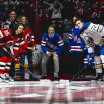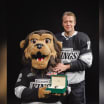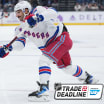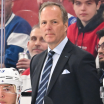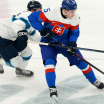As a resident of Minneapolis, he's become invested in the community, especially the multicultural thoroughfare of Lake Street. The diverse makeup of the neighborhood is not unlike that of his own family. Dumba's grandparents, Robert and Edna Hanson had eight children, seven of whom were adopted and are from a variety of ethnic backgrounds. Among them was Dumba's mother Treena, who is Filipino. And although his family moved from his hometown of Regina, Saskatchewan, to Calgary when he was 6 because his dad, Charles, who is of German and Romanian descent, had to relocate for a job, Matt maintained relationships with his aunts, uncles, and cousins and has grown closer to them as he's gotten older. The Filipino friends his mother has made over the years are part of the family now too, complete with backyard cookouts featuring whole roasted pigs and his favorite spring rolls.
So in May, when George Floyd, a Black man from Minneapolis, was killed by police officers not far from his beloved Lake Street, and the subsequent protests and demonstrations led to property damage of its many Black, Indigenous and People of Color-owned restaurants and other businesses, it affected him on a deeply personal level.
He started Rebuild Minnesota, a fundraiser that aims to donate $500,000 to the Lake Street Council and the BIPOC-businesses that were damaged. He pledged to match $100,000 in donations and received commitments to match the same amount from the Wild and NHL. As part of the fundraiser, he and his younger brother Kyle, who custom paints sneakers, designed a pair of Air Jordans and raffled it off. They also teamed up for a pair of painted CCM skates that featured some of Lake Street's businesses, HDA imagery, and the phrase "Hockey Needs More Colour." The skates raised $5,225 on NHL Auctions.



